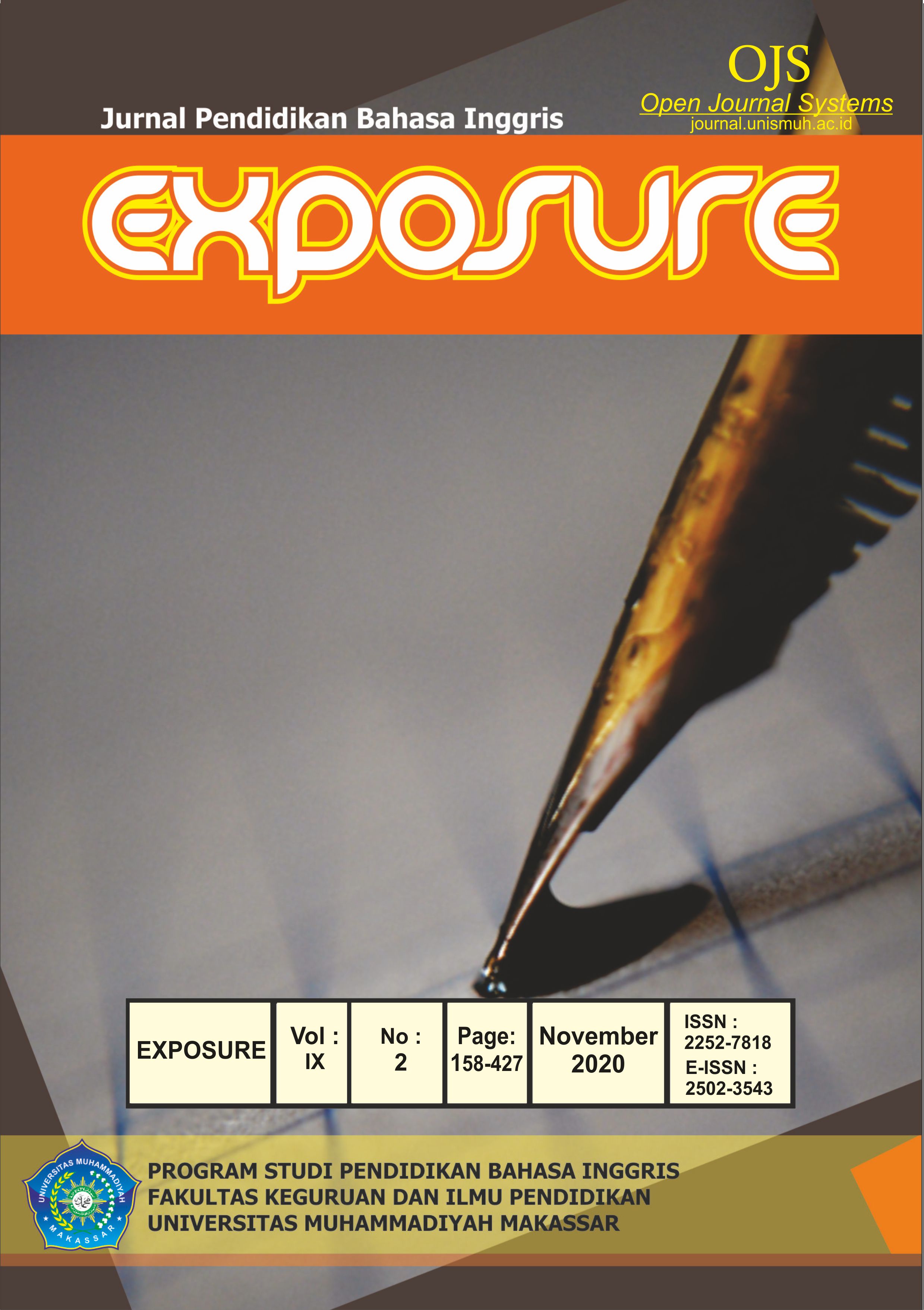TEACHER’S QUESTIONING STRATEGIES IN SCAFFOLDING STUDENTS’ LEARNING AT UNIVERSITY LEVEL
DOI: https://doi.org/10.26618/exposure.v9i2.4170
rephrasing, redirecting, probing, reinforcement, and level of questions
Abstract
Evidence is mounting that teacher questions can assist students in various purposes in the teaching-learning process (Blosser, 2006; Bond, 2007; Cotton, 2007). The teacher tends to deliver a simple to the complex level of question, for the discussion can run smoothly (Bloom’s taxonomy level, 1956). Despite this, a variety of good questions will not guarantee that the interactive classroom will be created, the teacher needs to employ rephrasing, redirecting, probing, and reinforcement in her questioning (Goodwin et al, 1992). However, practically, teachers ask a large number of questions, which somehow they fail in doing questioning strategies (Wragg and Brown, 2001:p.28). This conceptual article describes the teacher’s questioning strategies in facilitating students’ learning and promoting their thinking skills. It highlights the fact that a teacher who has initially lack the ability to teach higher thinking skills can make considerable progress in terms of applying her knowledge in the classroom (Zohar & Dori, 2011). This article ends by arguing for some changes that need to occur in effective classroom questioning, including the need to give a stronger description of the extent of the level of question and the questioning strategies, which the teacher employed.
References
Bloom, B.S. (Ed). 1956. Taxonomy of Educational Objectives: Handbook I Cognitive Domain. New York: David McKay Company.
Blosser, Patricia. 2000. How to Ask the Right Questions. USA: National Science Teacher Association.
Bond, Nathan. 2007. Questioning Strategies That Minimize Classroom Management Problem. Kappa Delta PI Record.
Bonne, R, and Pritchard, L. 2009. “Teacher Researchers Questioning their Practice”. Mathematics: Essential Research, Essential Practice — Volume 1.pp. 133-142.
Brown, G. 1975. Micro Teaching a Programme of Teaching Skills. London: Methuen Co Ltd.
Cakmak, M. 2009. “Pre-Service Teachers’ Thoughts about Teachers’ Questions in Effective Teaching Process”. Elementary Education Online, 8(3), p. 666-675. http://ilkogretim-online.org.tr.
Cotton, Kathleen. 2000. “Classroom Questioning”. Paper presented in North West Regional Education laboratory, Kansas.
Creese, Angela. 2005. Teacher collaboration and talk in a multilingual classroom. Canada: Cromwells Ltd.
Cresswell, J.W. 2012. Educational Research; Planning, Conducting, Evaluating Quantitative and Qualities Research 4th ed. London: Pearson Education Inc.
Goodwin, S.S., sharp, G.W., Cloutier, E.F., Diamond, N.A., and Dalgaard, K.A. 1992. Effective Classroom Questioning. University of Illinois-Urbana: Office of Instructional and Management Services.
Miles, M.B, and Huberman, A.M. 1994. Qualitative Data Analysis 2nd Ed. London: Sage Publication.
Sadker, D and Sadker, M. 1999.“Questioning Skills in Classroom Teaching Skills”. In Cooper, James (Ed). Classroom Teaching Skill 6thed. Boston: Houghton NIFFLIN Company.
Sadker, D and Sadker, M. 2010.“Questioning Skills in Classroom Teaching Skills”. In Cooper, James (Ed). Classroom Teaching Skill 9thed. Boston: Houghton NIFFLIN Company.
Shen, P, and Yodkhumlue, B. 2010. “Teacher’s Questioning and Students’ Critical Thinking in College EFL Reading Classroom”. Paper presented on the 8th International Postgraduate Research Colloquium: Interdisciplinary Approach for Enhancing Quality of Life IPRC Proceedings, (pp. 44-53).
Wragg, E. C, and Brown, G. 2001. Questioning in the Secondary School. New York: Routledge.
Downloads
Published
How to Cite
Issue
Section
License
Authors who publish with this journal agree to the following terms:
In order to assure the highest standards for published articles, a peer review policy is applied. In pursue of the compliance with academic standards, all parties involved in the publishing process (the authors, the editors and the editorial board and the reviewers) agree to meet the responsibilities stated below in accordance to the Journal publication ethics and malpractice statement.
Duties of Authors:
- The author(s) warrant that the submitted article is an original work, which has not been previously published, and that they have obtained an agreement from any co-author(s) prior to the manuscript’s submission;
- The author(s) should not submit articles describing essentially the same research to more than one journal;
- The authors(s) make certain that the manuscript meets the terms of the Manuscript Submission Guideline regarding appropriate academic citation and that no copyright infringement occurs;
- The authors(s) should inform the editors about any conflict of interests and report any errors they subsequently, discover in their manuscript.
Duties of Editors and the Editorial Board:
- The editors, together with the editorial board, are responsible for deciding upon the publication or rejection of the submitted manuscripts based only on their originality, significance, and relevance to the domains of the journal;
- The editors evaluate the manuscripts compliance with academic criteria, the domains of the journal and the guidelines;
- The editors must at all times respect the confidentiality of any information pertaining to the submitted manuscripts;
- The editors assign the review of each manuscript to two reviewers chosen according to their domains of expertise. The editors must take into account any conflict of interest reported by the authors and the reviewers.
- The editors must ensure that the comments and recommendations of the reviewers are sent to the author(s) in due time and that the manuscripts are returned to the editors, who take the final decision to publish them or not.
Authors are permitted and encouraged to post online a pre-publication manuscript (but not the Publisher’s final formatted PDF version of the Work) in institutional repositories or on their Websites prior to and during the submission process, as it can lead to productive exchanges, as well as earlier and greater citation of published work (see The Effect of Open Access). Any such posting made before acceptance and publication of the Work shall be updated upon publication to include a reference to the Publisher-assigned DOI (Digital Object Identifier) and a link to the online abstract for the final published Work in the Journal.














